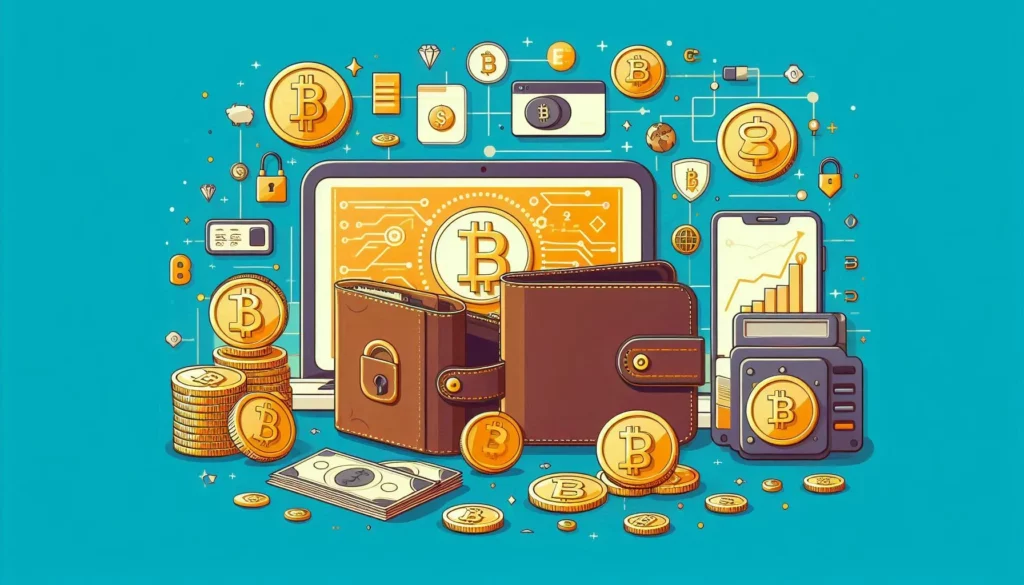Cryptocurrency wallets are an essential part of the cryptocurrency ecosystem.
They allow you to store, send, and receive cryptocurrencies.
In this blog post, I will discuss everything you need to know about cryptocurrency wallets, including:
- Security tips for cryptocurrency wallets
- What are cryptocurrency wallets?
- The different types of cryptocurrency wallets
- How to choose the right cryptocurrency wallet for you
- How to use a cryptocurrency wallet
Without further ado let’s get started…
Welcome to the fascinating world of cryptocurrencies!
Whether you are dipping your toes into Bitcoin, Ethereum, or any other digital currency, you will quickly learn that a cryptocurrency wallet is your trusty sidekick.
It is where your digital money lives, breathes and thrives.
But with so many wallet options out there, it can feel like navigating a maze.
Fear not!
This comprehensive cryptocurrency wallets guide is your treasure map to understanding crypto wallets, picking the perfect one, and most importantly, keeping your hard-earned crypto safe.
Crypto Wallets 101: The Basics You Need to Know
A cryptocurrency wallet is a digital wallet that allows you to store, send, and receive cryptocurrencies.
Cryptocurrency wallets are not like traditional wallets, which store physical currency.
Instead, cryptocurrency wallets store the private keys that give you access to your cryptocurrencies.
Think of a cryptocurrency wallet as a digital bank account.

It’s not a physical container but a clever piece of software or a special device that holds the keys to your crypto kingdom.
These keys are like secret codes that prove you own your digital assets and allow you to spend them when you want.
The different types of cryptocurrency wallets
There are four main types of cryptocurrency wallets:
Hardware wallets: Hardware wallets are the most secure type of cryptocurrency wallet.
They are physical devices that store your private keys offline.
This means that your private keys are not stored on any online device, which makes them less vulnerable to hacking.
Software wallets: Software wallets are digital wallets that are installed on your computer or mobile device.
They are more convenient than hardware wallets, but they are also less secure.
Web-based wallets: Web-based wallets are wallets that are stored on a website.
They are the least secure type of cryptocurrency wallet, but they are also the most convenient.
Paper wallets: Paper wallets are pieces of paper that contain your private keys. They are very secure, but they can be difficult to use.
Why Crypto Wallets Are a Must-Have:
Proof of Ownership: Imagine misplacing your house keys. Without them, you can’t access your own home!
Your crypto wallet holds the “keys” to your digital money, so you can’t touch your crypto without it.
The Ultimate Safeguard: Top-notch wallets are like digital Fort Knox, protecting your funds from hackers and online threats with strong encryption and security measures.
Take Control of Your Money: Your wallet puts you in the driver’s seat.
You decide when to buy, sell, or hold on to your crypto. No one else can touch it without your permission.
Open the Door to DeFi: Wallets unlock the exciting world of decentralized finance (DeFi), where you can lend, borrow, trade, and even earn interest on your crypto.
Hot vs. Cold: Choosing Your Wallet Style
Crypto wallets come in two main flavours, each with its pros and cons:
Hot Wallets (Online)
- Connected to the internet, making them super convenient for everyday use and transactions.
- They are like the regular wallet that you carry around – easy to access, but you need to be mindful of pickpockets.
- Examples: Mobile wallet apps (like Coinbase Wallet or Trust Wallet), websites you access on your computer, or software you install on your desktop.
- The Upside: Easy to use, quick access to your crypto, often free.
- The Downside: It is slightly more vulnerable to hackers because they are online.
Note: Software and Web-based wallets are hot Wallets because they are connected to the internet.
Cold Wallets (Offline)
- Kept safely offline, usually on a small device like a USB drive or a specialized hardware wallet (e.g., Ledger or Trezor).
- Think of them as a super-secure safe deposit box for your valuables.
- The Upside: Rock-solid security as they are not connected to the internet, ideal for storing large amounts of crypto that you don’t plan on spending right away.
- The Downside: Not as convenient for frequent transactions, and can be a bit pricey.
Note: Hardware and Paper wallets are considered cold wallets since they are not connected to the internet.
Which One Should You Choose?
There is no right or wrong answer. It all boils down to your personal needs and how you plan to use your crypto.
Therefore, if security is your top priority, a cold wallet is your best bet.
If you need quick access to frequent transactions, a hot wallet might be more suitable.
Many crypto enthusiasts use both – a hot wallet for everyday spending and a cold wallet for long-term savings.
Wallet Shopping 101: Features That Matter
When you are browsing for the perfect crypto wallet, keep these key features in mind:
Security Features: Does it offer two-factor authentication (2FA), multi-signature support (requiring multiple approvals for transactions), and secure backup options?
User-Friendliness: Is the interface easy to navigate, especially if you’re new to crypto?
Supported Coins: Does it support the specific cryptocurrencies you want to hold? Not all wallets support every coin.
Reputation & Reviews: What are other users saying about the wallet? Look for reviews and ratings to gauge its reliability.
Customer Support: Good customer support can be a lifesaver if you ever encounter any issues.
Keeping Your Crypto Fort Knox Secure: Best Practices
Protecting your crypto wallet is non-negotiable. Here’s your security checklist:
- Strong & Unique Passwords: Create a long, complex password that you don’t use anywhere else.
- Enable 2FA: It adds an extra layer of security, requiring a code from your phone or another device to log in.
- Regular Backups: Back up your wallet’s “recovery phrase” (a set of words that can restore your wallet) in multiple secure locations – offline is safest.
- Stay Up-to-Date: Always update your wallet software to the latest version. Updates often include security patches.
- Beware of Phishing Scams: Don’t click on suspicious links or share your password/recovery phrase with anyone.
The Future of Crypto Wallets: More Than Meets the Eye
Crypto wallets are evolving rapidly, offering much more than just storage:
Earn Passive Income: Some wallets let you stake your crypto, essentially locking it up to support the network and earning rewards in return.
Coinbase can be a better place to stake and earn passive income through rewards
Swap with Ease: Exchange different cryptocurrencies directly within your wallet without using a separate exchange.
Binance and CoinSwitch can be a better fit for you.
However, it’s important to compare the features and fees of each platform before making your decision.
Dive into NFTs: Store and manage unique digital collectables like art, music, and more.
Connect to DeFi: Access a wide range of decentralized applications for lending, borrowing, yield farming, and other exciting possibilities.
Cryptocurrency Wallets – My Final Thoughts
Cryptocurrency wallets are an essential part of the cryptocurrency ecosystem. They allow you to store, send, and receive cryptocurrencies.
There are four main types of cryptocurrency wallets: hardware wallets, software wallets, web-based wallets, and paper wallets.
The best cryptocurrency wallet for you will depend on your individual needs and preferences.
In addition to the above, I would also like to add the following:
- Cryptocurrency wallets are a relatively new technology, and there are still some risks associated with using them. It is important to do your research before choosing a cryptocurrency wallet.
- Cryptocurrency wallets are not regulated by any government agency. This means that you are responsible for protecting your cryptocurrencies.
- Cryptocurrency wallets can be used to store a variety of different cryptocurrencies. However, not all wallets support all cryptocurrencies.
- Cryptocurrency wallets are a great way to get started with cryptocurrency. However, they are not a replacement for traditional investment advice.
I hope this blog post has been helpful. If you have any questions, please feel free to leave a comment below.

